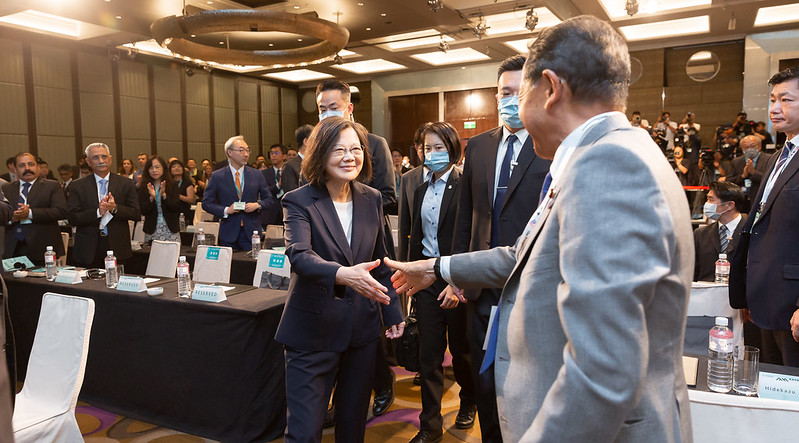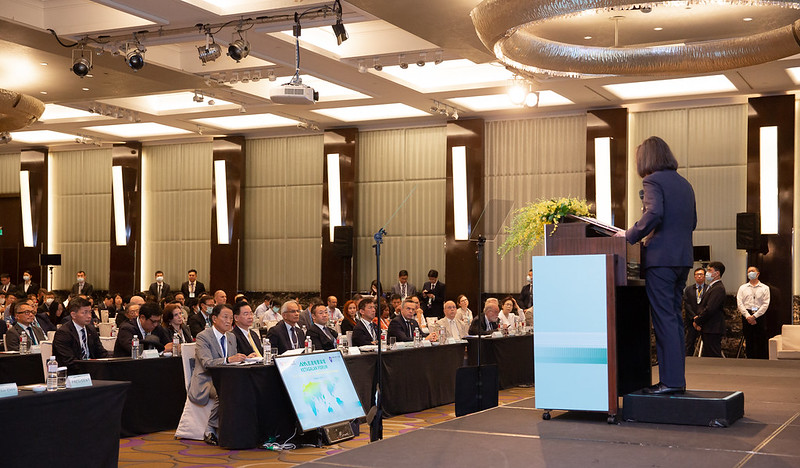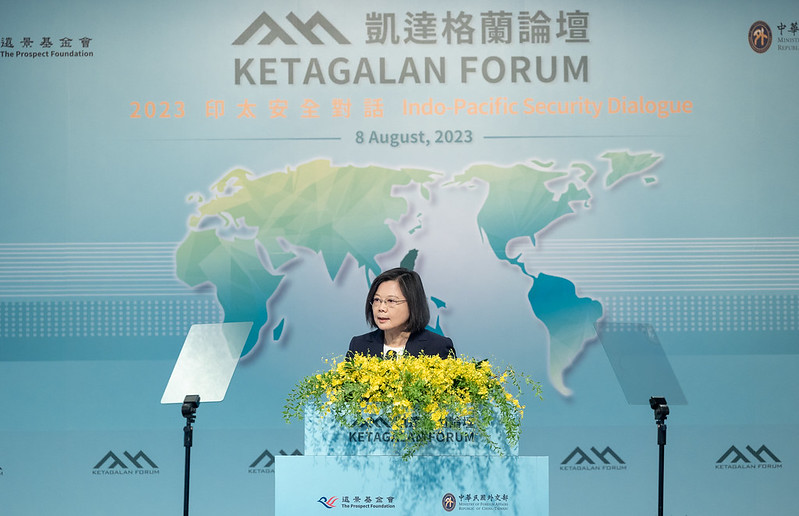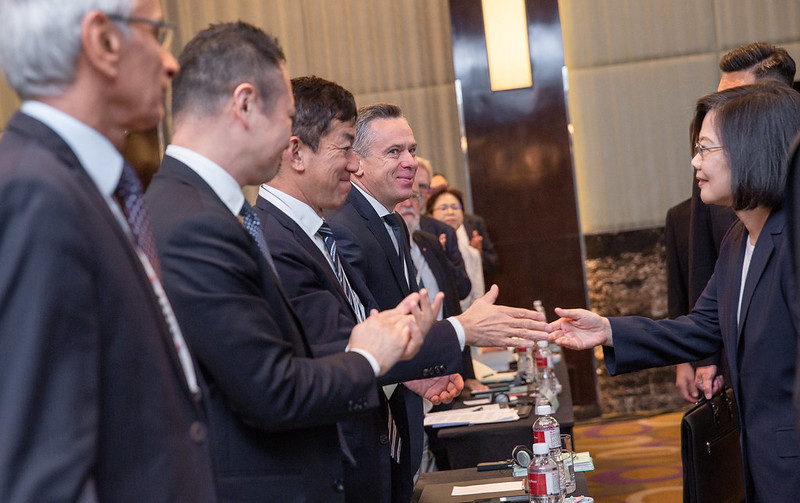News & activities
 News releases
News releases
On the morning of August 8, President Tsai Ing-wen attended the opening of the Ketagalan Forum: 2023 Indo-Pacific Security Dialogue. In remarks, President Tsai stated that maintaining the rules-based order is imperative to our region's stability and prosperity. The president said that Taiwan has dedicated itself to being part of the democratic alliance that works to prevent authoritarian expansionism while tackling issues such as climate change, emerging diseases, and terrorism. She also pointed out that Taiwan's high-tech sector, especially with its leading edge in semiconductors, will be crucial to creating a secure global supply chain.
Noting that a critical juncture for the Indo-Pacific region is in front of us, President Tsai stated that there are new opportunities for Taiwan to play a constructive role and that Taiwan is a crucial force in nurturing an alliance for the peaceful development and prosperity of our region.
A transcript of President Tsai's remarks follows:
I would like to begin by extending a very warm welcome to those who have come to Taiwan to participate in the Ketagalan Forum this year.
And, I also want to offer special thanks to former Prime Minister of Japan, Mr. Aso Taro, and former Prime Minister of Estonia, Mr. Andrus Ansip, for joining us today and sharing your invaluable insights with us. Your presence here is also a demonstration of the staunch support from our democratic friends around the world.
In recent months, I received quite a few delegations from Japan, as well as delegations from Central and Eastern Europe. I was very moved by the overwhelming support they extended to Taiwan. From Taiwan's meaningful participation in international organizations, such as the WHO (World Health Organization), to the peace, stability, and security of the Taiwan Strait and Taiwan's application to the CPTPP (Comprehensive and Progressive Agreement for Trans-Pacific Partnership), our international friends have continued to speak out on behalf of Taiwan.
It feels like a long time since we last saw each other. The last time we held this forum, there were still pandemic restrictions, and many participants could only join virtually. Now the pandemic has abated, but world and regional politics are changing at a pace that presents us with new challenges quite frequently; challenges such as how the situation across the Taiwan Strait influences the global security order, how information, cognitive warfare, and gray-zone tactics influence democracies, and what role Taiwan can play in international supply chain restructuring.
This year's Ketagalan Forum will serve as a platform to facilitate discussions on these essential issues, as we forge ahead toward a world that will be greatly affected by developments in the Indo-Pacific region.
The Indo-Pacific is still the world's fastest growing region, even after the pandemic. It presents the world with countless opportunities in trade, manufacturing, and education, and to achieve economic prosperity. The stability of this region gives reassurance about the development of the global economy and security. And it has a pivotal role to play in deciding the course of the 21st century.
The emergence of an influential Indo-Pacific has also been accompanied by newly developed tensions and contradictions of political systems. Authoritarian regimes have become more aggressive and assertive. They are also more convinced that their alternative model is better and more adaptive than democracy. This is the main driver of friction between countries, especially in the region. As we are gathered here today, democracies, our security, and the rules-based international order are now faced with their greatest challenges.
The late Prime Minister of Japan Abe Shinzo anticipated the challenges we would face over the coming decades. When he was prime minister, he outlined a vision of a free and open Indo-Pacific that has become a central goal of the global democratic community.
His legacy laid the foundation for a new composition of regional partnerships. Now, we are in a stronger position to carry on and maintain the rules-based order that is imperative to our region's stability and prosperity.
My administration has dedicated itself to being part of the democratic alliance that works to prevent authoritarian expansionism, while tackling hurdles such as climate change, emerging diseases, terrorism, and ensuring a secure supply chain. And as the alliance advocates for a sustainable, comprehensive, and rules-based approach to connectivity, Taiwan can serve as an indispensable partner in building democratic resilience and facilitating development in sectors such as biotechnology, renewable energy, and semiconductors.
In addition, Taiwan is committed to working with regional actors to ensure regional stability. As Japan, Estonia, and democracies from around the world lend their precious support to Taiwan, Taiwan is willing to shoulder our share of burden.
Taiwan has been taking the necessary measures to upgrade our security capabilities. We have set up new facilities to advance our domestic development of naval vessels. We have taken steps to bolster and train our reserve forces. We have also made substantial investments to enhance our asymmetric defense capabilities. All these efforts are contributing to our move toward self-sufficiency in our national defense.
This also demonstrates that Taiwan does not take our security partners' backing for granted. While we don't seek military confrontation and hope for a peaceful, stable, and beneficial co-existence with our neighbors, Taiwan is always ready to defend our democracy and way of life.
The Taiwanese government and NGOs have also worked hard to combat disinformation campaigns from authoritarian regimes while still safeguarding the right to free speech. Members of Taiwan's civil society are also actively sharing their experience with partners from around the world.
One of the important topics at this forum is the role of Taiwan in the restructuring of the international supply chain. Taiwan's high-tech sector, especially its leading edge in the semiconductor sector, will be a crucial component in creating a secure global supply chain that protects critical technologies from exploitation.
Taiwan also has an innovative role to play in high-precision manufacturing, artificial intelligence, renewable energy, biotech, and many other sectors. This can help create more diverse and resilient global supply chains that can withstand interruptions.
Furthermore, Taiwan's capabilities also lie in its experience and abilities in education, human resource development, public health, medicine, humanitarian aid, and natural disaster prevention. Our medical facilities have been sharing their experience in medical technology and management to improve public health and medical care in the region.
A critical juncture for our region is in front of us. There are new opportunities for Taiwan to play a constructive role. Taiwan is a crucial force in nurturing an alliance for the peaceful development and prosperity of our region.
The past three years have been marked by the pandemic, war, and economic downturn. But, despite the trials and tribulations, we have also borne witness to resilience, strength, friendship, and partnership.
Last August, Taiwan experienced four consecutive days of live-fire military exercises from the PRC (People's Republic of China). As the military exercises went on, administrations and legislatures of more than 50 countries, as well as more than 500 parliamentarians, spoke up for the security of Taiwan.
And, as the European Commission President Ursula von der Leyen said in the Philippines recently, the European Union would not tolerate aggression in the Indo-Pacific region. These strongly worded statements are demonstrations that peace and stability in the Taiwan Strait and the maintenance of a free and open Indo-Pacific region are imperative as the world moves toward the future.
I want to take this opportunity to reiterate my deep appreciation to our like-minded friends and partners for coming to our support and aid at every critical time.
While extraordinary challenges remain, I see democracies working to safeguard shared values and institutions and serve the interests of the international community. And, our belief in democracy and freedom have never been stronger.
To conclude, I want to wish you all a very successful forum and a pleasant stay in Taiwan. And, thank you, Chairman [of the Prospect Foundation Mark Tan-Sun] Chen (陳唐山), for the invitation to speak. Thank you very much.
Also in attendance at the event were Japanese House of Representatives Members Suzuki Keisuke and Nakanishi Kenji. Chairman of India's National Maritime Foundation Karambir Singh, Member of the Lithuanian Seimas Vilius Semėška, Vice President for International Security and Diplomacy at the US's Asia Society Policy Institute Daniel Russel, and Director of the Interdisciplinary Cyber Research Center at Tel Aviv University Isaac Ben-Israel were among the 14 parliamentarians, politicians, and scholars from 12 countries who participated in this year's dialogues with officials, scholars, and experts from Taiwan.












